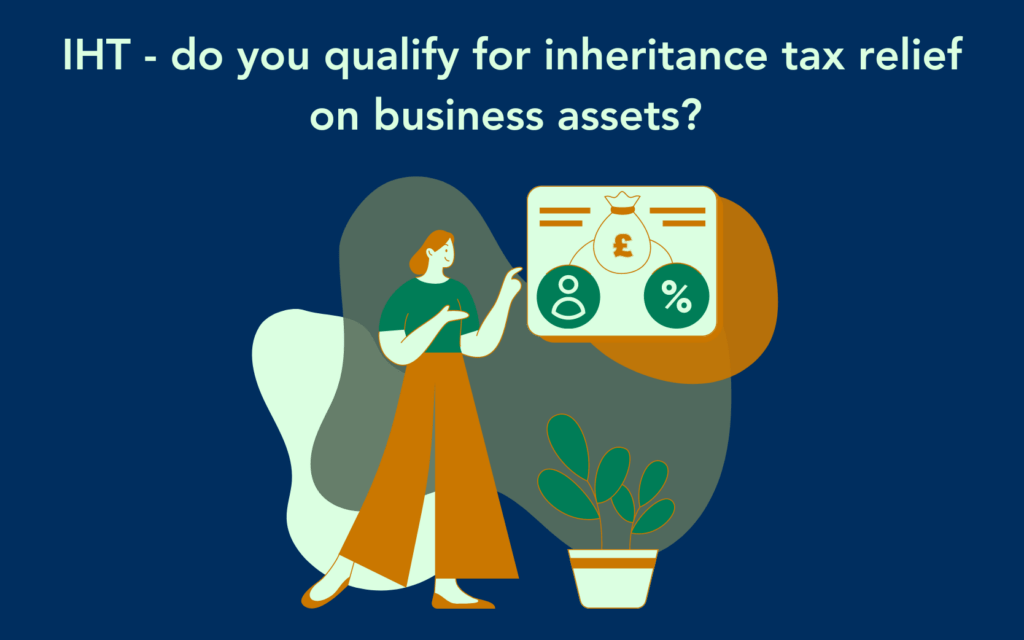
This article was written prior to the October 2024 Budget announcement. Stated reliefs are subject to change from 6 April 2026
In previous issues of ProActivity, we’ve covered the topic of inheritance tax (IHT); explaining what it is, how to navigate it, as well as how to maximise tools like lifetime gifts to minimise the amount of liable value within your estate. In this article, we want to focus on the available inheritance tax reliefs on business assets and to business owners with expert insight from our resident Tax Manager, Chris Beard.
Business relief – until 5th April 2026
Business relief (previously known as Business Property Relief) is a way to reduce the amount of IHT payable on certain business assets. It was introduced with the aim of helping family-owned business to continue trading, after the death of a key person or shareholder. Prior to the establishment of business relief, shares in the business and sometimes entire businesses would have to be sold to meet the inheritance tax liability.
If you own a business, this will be included in your estate for the purposes of IHT. The table below shows how much business relief will reduce the taxable value of qualifying business assets:
| A business or interest in a business (including a partnership share) | 100% |
| Shares in an unlisted company | 100% |
| Shares with 50% or more control in a listed company | 50% |
| Land, buildings, machinery owned by the deceased and used in a business they controlled or were a partner in | 50% |
To qualify, the assets must have been owned by the deceased for at least two years prior.
Potential pitfalls
The business must also be trading to qualify for business relief and would need to demonstrate that trading activity makes up more than 50% of its overall activities. This means that businesses that are heavily involved in investment activities such as buying and selling shares or holding property investments are unlikely to qualify for business relief. Similarly, a “cash-rich” company may also be denied inheritance tax reliefs on business assets if HMRC feels the cash held by the business is more than that required to run its future business operations.
Businesses that are being sold or have a binding contract for the sale on the owner’s death (or lifetime transfer) are also unlikely to qualify for the relief.
Lifetime gifts of business assets
You may be considering placing shares or a company property into a trust for your loved ones’ future. Lifetime gifts into a trust that exceed the inheritance tax threshold may still be subject to a lifetime inheritance tax charge. Thankfully, qualifying assets can still benefit from business relief and will either negate or reduce the lifetime inheritance charge depending upon the assets placed into the trust.
All lifetime gifts, whether they are made through a trust or not, may have capital gains tax implications, so please ensure you take the appropriate professional advice beforehand.
Agricultural relief – until 5th April 2026
For business owners who’s businesses sit within the agricultural sector and those involved directly with farming – you may qualify for agricultural relief. So, what qualifies for agricultural relief? It’s available on assets used within a farming business, covering UK-based land and pasture used to grow crops and rear animals, farm buildings, farm cottages and farmhouses. For farmhouses and cottages to qualify, they must be occupied by either the owner (or spouse), a farm worker, or a retired farm employee.
As with business relief, the assets must have been owned and occupied for agricultural purposes for two years for them to qualify.
100% agricultural relief is available on the land that has been farmed by the owner, with 50% relief available on all other qualifying assets.
Land that is occupied by a tenant may still be entitled to agricultural relief, however it will need to have been farmed by the tenant for a longer qualifying period of 7 years.
Unfortunately, relief is not available on farm equipment or machinery, derelict buildings, harvested crops, livestock or property that is subject to a binding contract sale.
Maximising all available reliefs
Where agricultural property satisfies the conditions for business relief, agricultural relief is given first and business relief is given on the non-agricultural value.
Both business relief and agricultural relief are best suited to situations where it is the desire that your family or business partners continue running the business you have built up. If your loved ones would see more benefit from cashing in your business assets then unfortunately this is likely to have tax consequences. Where this happens, carefully considered lifetime planning still remains key and can still save a significant amount of inheritance tax.
How can we help?
As always, we thoroughly recommend that you speak to your Accountant to not only assess whether you qualify for inheritance tax reliefs on business assets, but also put in place an effective lifetime plan for your estate. If you’d like to speak to one of our qualified professionals, please get in touch with Chris Beard, our resident Tax Manager.

